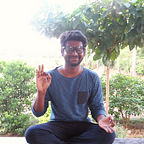The connotation of “life” is as diverse as the number of people who are alive on this planet and it is also the notion that our species is trying to comprehend wistfully since its evolution. Essentially, the contemplation over the nature of existence has resulted in the emergence of various social, cultural norms and the ideas such as God, after life, morality, were necessary for associating human mind in positive endeavors by preventing it from descending into the existential question that had proved to be unfathomable. A pertinent conclusion is that, when a society evolves across vast time frames, these fundamental ideas are prone to vitiation, fallout of which is the institutionalization of these norms into religious beliefs.
Dualism renders two dichotomous conclusions to this existence problem:
- Existence has No meaning
- Existence has a meaning
Postulation that existence has no meaning is an interesting assertion to ponder because of the fact that it assumes Nature has no bias for living things. Both living and non-living things follow the same set of Physical laws and are just two different manifestations of the same energy that permeates our universe. Their disparate nature is only attributable to the Configuration of their constituent elementary particles.
The other supposition, Existence has a meaning, is the idea which has engrossed most of the people, who were speculating about their existence, for several millennia. This posit bestows a special Status for the feeling of “Self”, which is believed to differentiate the living existence from non-living existence. Accordingly, “Self” is the experience ascribed to something called as “Soul” (Consciousness), which gives a special meaning to existence for living things, in particular, for human beings.
One defining aspect of a living thing is its predilection for being alive. It always chooses to sustain the life whenever a choice between life and death is offered by its environment. It is different from a living being’s craving to be alive. This craving has its roots in the senses which is the outcome of a living system’s interaction with its environment. A person wants to stay alive if one finds comfort to be alive. A person desires to die when one perceives life as misery. Contrarily, the conglomeration of life has always chosen to stay alive which is the Crux of evolution. Adeptness of life in survival should not be conceived as species specific or individual specific.
“The apparent inconsistency between nature’s apathy towards individual lives and its proclivity towards sustenance of life, can only be fathomed with the context of consciousness”
An acceptable definition of life is that it is a resistance against the decay into an inert equilibrium state with the environment. In our universe a myriad of complex structures, such as stars, galaxies, super clusters, are produced and destroyed. But these structures are formed and destroyed according to known set of physical laws. Not every complex process has a life of its own. Existence, being common to both living and non-living, should have two levels to account for the special nature of consciousness. Hence, a life is more than the set of physical laws that meets our comprehending abilities.
A free will is often quoted as the fundamental property of consciousness. It can be construed as the ability to make favorable choices (not to be confused with everyday decisions that living things make) against the odds set out by environment. An ideal coin, when tossed for infinite times, has equal probability of turning up heads and tail. If consciousness is included in this scenario as an observer, it affects the outcome of the coin. The degree to which it can affect the outcome is contingent to debate which requires a digression towards the observation problem of quantum mechanics and spiritual enlightenment.
